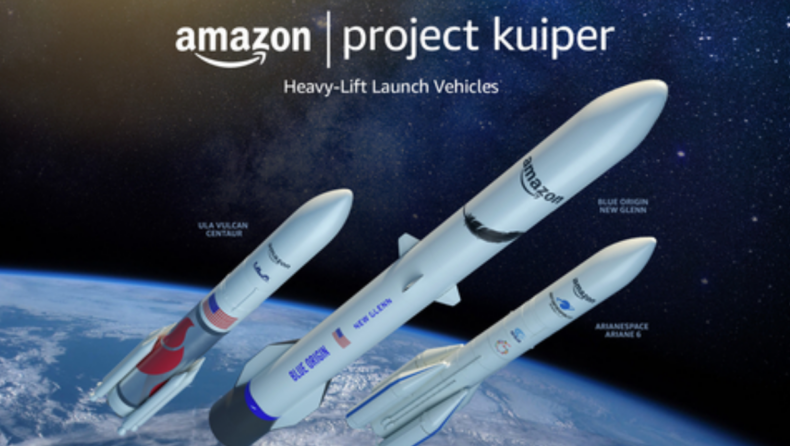Amazon said today that it has reached agreements with Arianespace, Blue Origin, and United Launch Alliance to supply heavy-lift launch services for Project Kuiper, Amazon’s project to expand global internet access through a constellation of low-Earth-orbit satellites. Over a five-year period, the contracts might result in 83 launches, allowing Amazon to deploy the majority of its 3,236-satellite network. It is the world’s largest commercial launch vehicle procurement.
“Project Kuiper will bring fast, inexpensive internet to tens of millions of people in unserved and underserved areas around the world,” said Dave Limp, Senior Vice President of Amazon Devices & Services. “While there is still more work to be done, the team has proceeded to achieve milestone after milestone in every facet of our satellite system.” These launch agreements demonstrate our unwavering trust in Project Kuiper, and we’re honored to be collaborating with such a talented group of collaborators to complete our objective.”
Amazon‘s Project Kuiper, like Musk’s Starlink, aims to provide high-speed, low-latency broadband to a wide range of customers, including individuals, schools, hospitals, businesses, government agencies, disaster relief operations, mobile operators, and other organizations working in areas where internet connectivity is unreliable.
Amazon is building and developing the complete system in-house, integrating a sophisticated LEO satellite constellation with compact, affordable customer terminals and a secure, reliable ground-based communications network. Amazon presently employs over 1,000 workers working on Project Kuiper.
Amazon is planning a $10 billion investment in its satellite internet network. The size of these contracts will help enhance the launch services industry as a whole, resulting in more innovation and job development in the US and Europe. Blue Origin and ULA rely on ArianeGroup’s network of suppliers from 13 European nations to develop and manufacture their next-generation heavy-lift launch vehicles, while Arianespace relies on ArianeGroup’s network of suppliers from 49 U.S. states to develop and build its Ariane 6 rocket.
In addition, Amazon is collaborating with Beyond Gravity (previously RUAG Space), a space technology company based in Switzerland, to develop low-cost, scalable satellite dispensers that will aid in the deployment of the Project Kuiper constellation. As a result of the partnership, Beyond Gravity will construct a brand-new production facility, tripling its capacity and creating dozens of jobs.
“Securing launch capacity from multiple providers has been a key part of our strategy from day one,” said Rajeev Badyal, Vice President of Technology for Project Kuiper at Amazon.
Arianespace

The European spaceline Arianespace has established itself as a global leader in the launch services market, having completed 15 successful launches last year, including the launch of the James Webb Space Telescope in late December. Arianespace is on track to launch Ariane 6, its next-generation heavy-lift launch vehicle, by the end of the year. As part of this initial arrangement, Amazon will receive 18 Ariane 6 rockets.
Blue Origin

Amazon has reached an agreement with Blue Origin to secure 12 New Glenn launches, with the possibility of up to 15 more. New Glenn is propelled by seven BE-4 engines, and its reusable first stage is designed to carry out at least 25 missions.
United Launch Alliance
The arrangement between Amazon and United Launch Alliance (ULA) comprises 38 launches using ULA’s newest heavy-lift launch vehicle, the Vulcan Centaur. This launch services contract includes covers manufacturing and launch infrastructure at Cape Canaveral Space Force Station, including a new, dedicated Vulcan Launch Platform (VLP).
ULA is investing further in its Spaceflight Processing & Operations Center (SPOC) to build a second facility capable of full vehicle processing, giving the launch site two parallel “launch lanes” for high-cadence operations. The deal comes on top of Project Kuiper’s current agreement with ULA to secure nine Atlas V aircraft.
About Amazon’s competitor
Meanwhile, Starlink has launched over 2,000 satellites since the beginning of 2019, with many more on the way. SpaceX has been granted authority to launch 12,000 Starlink satellites and has filed for authorization to launch up to 30,000 more satellites.

Musk forged a partnership with Microsoft, Amazon’s biggest cloud computing competitor, to leverage Microsoft’s Azure platform to provide his version of satellite-powered internet service.
Published by: Shivani Bhalke
Edited by: Subbuthai Padma













